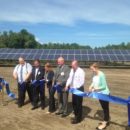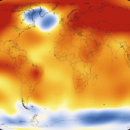Last year, Massachusetts’ highest court ruled in favor of environmental groups who argued the state hasn’t been doing enough to reach its goal of reducing greenhouse gas emissions. Those goals were put into law in 2008.
The law calls for the state to reduce emissions to 25 percent below 1990 levels by the year 2020. The Supreme Judicial Court ordered the Massachusetts Department of Environmental Protection to come up with new regulations to ensure the state meets that mark. Those new rules are getting public hearings this week.
For more on the new regulations and who would be affected by them, we spoke to David Abel, a reporter for the Boston Globe.
Click the audio player above to hear Henry Epp’s interview with Globe reporter David Abel.




